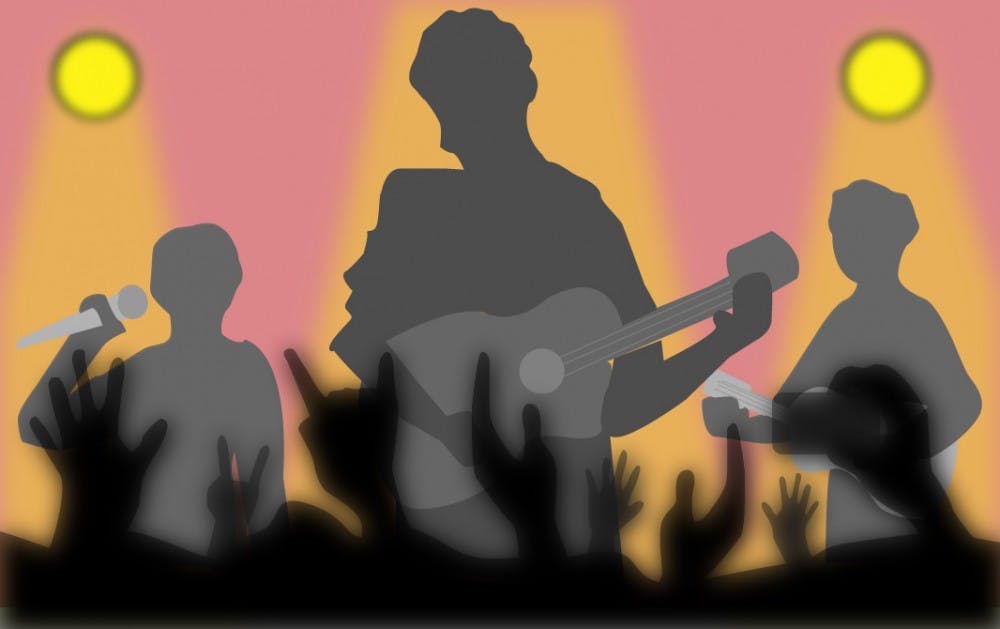Swishy bangs, too-tight pants, screaming and crying fangirls clutching overpriced tickets — let us never forget "stan Twitter" wars over which idol has a higher vocal range.
For executives and stockholders, these are the lifeblood of entertainment companies, bringing in millions of dollars each year. But to a teenage girl coming into her own, these are the things that teach her self-love and make her world spin.
These are boy bands.
Women of all ages have found solace in groups who create safe spaces to express emotion in a healthy way, especially during their formative years.
When Harry Styles tells me how beautiful I am when I smile at the ground, I’m going to believe him because he said it straight to me. When boy bands use the second person in songs, it's easy for the listener to insert themselves into the narrative. It strengthens the idol and fan relationship, making the listener feel closer to them.
Maybe that 13-year-old girl who just got braces has never been told she was special or that the freckles on her cheeks are beautiful by anyone other than her parents. At this developmental stage in a young girl’s life, this kind of positivity and support from music is crucial. Middle school boys have cooties, but Harry Styles made us feel chosen.
Some dismiss the importance of this type of music beyond the ages of adolescence, but this notion is outdated.
The origin of the modern boy band comes from clean-cut beginnings, stemming back to barbershop a cappella quartets, where male groups sang in four-part harmony — though the term “boy band” was not widely used until the 1990s.
The world has seen many versions of what it means to be a boy band, starting with The Beatles. Though known to be a rock band — not the genre generally associated with modern boy bands — journalists have nicknamed The Beatles "the first boy band" due to their unprecedented fervent female fanbase.
Many groups sprouted over the next few decades ranging in genres from Motown to R&B, eventually evolving into the all too familiar pop. The Osmonds, the Jackson 5 and New Edition were all different in sound and style, yet they followed similar formats. Close harmonies, choreographed dances and infectious rhythms became common practice for these types of bands to follow.
Initially, boy bands were not marketed toward young girls but rather at older markets. Groups formed with a focus on music and not fandom. It wasn’t until groups like ‘N Sync, Backstreet Boys and 98 Degrees when the misconception of what it means to be a boy band came about.
Araxi Hovhannessian, manager of Graduate Academic Advising Services at ASU, has a background in social psychology and women and gender studies. She said she believes the connection between boy bands and female fans has developed over time.
“If we look at The Beatles and then the Jackson 5, (for) this group, the age was a little different. I think it was above 18,” Hovhannessian said.
Now the age group has shifted primarily to 16 to 21 year olds, she said, but she sees girls as young as eight connect with this type of music.
The boy band narrative that permeates pop culture often assumes that girls listen to this music because they are naive or have “basic” taste. The king of boy bands himself, Harry Styles, touched on the inaccuracy of this viewpoint in a recent interview with Rolling Stone.
Styles explained that female fans are “the most honest.”
“We’re so past that dumb outdated narrative of ‘Oh, these people are girls, so they don’t know what they’re talking about.,’” he said. “They’re the ones who know what they’re talking about. They’re the people who listen obsessively … They’re running it.”
In our modern era, women and girls can be more vocal about their feelings. In the age of social media, they can more freely share their thoughts and connect with those who have similar passions.
"Stan Twitter," for example, is the social phenomenon of celebrity fandoms forming digital armies of support online — sharing photos, establishing friendships, using niche lingo and fiercely defending their idols.
Hovhannessian explained how this notion comes into play with conflicting cultural values.
“A girl who is being raised in a culture where they are telling them to be submissive … that group does not have the voice, and they really do not know how to express (emotions),” she said.
When teens do not receive enough attention, she said, they are hungry for any affection, Hovhannessian said. She believes girls find this attention within these boy groups.
I remember when I was 13. Like most, middle school was definitely not my golden years. I struggled with my confidence, and it seemed no boy ever liked me. So, who did I turn to when I felt unloved? Boy bands.
I had Luke Hemmings from 5 Seconds of Summer and Kim Jonghyun from SHINee telling me how amazing I was and that I deserve nothing more than to be happy. They were singing songs with me — to me. They were not capitalizing on my insecurities but rather saying it was OK to feel.
In the end, it did make me happy. I found the kind of affection I dreamed of receiving. I felt loved by a boy whom I loved back.
They may only know me as a face in a crowd of thousands, but I know them as so much more.
Reach the reporter at omunson@asu.edu and follow @munson_olivia on Twitter.
Like The State Press on Facebook and follow @statepress on Twitter.
Olivia Munson is a digital producer for The State Press. She previously served as editor of the publication's The Echo desk. In the past, she has worked for Arizona PBS, The Arizona Republic and The Entertainer! magazine.




